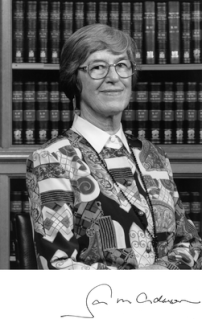A Quote by Margaret Feinberg
Wide awake to the presence of God, I realized I had been so focused on asking why a good God allowed bad things to happen that I was missing out on the nearness of God all along. In becoming preoccupied with the why, I was missing the who.
Related Quotes
Is there an answer to the question of why bad things happen to good people?...The response would be…to forgive the world for not being perfect, to forgive God for not making a better world, to reach out to the people around us, and to go on living despite it all…no longer asking why something happened, but asking how we will respond, what we intend to do now that it has happened.
A social order bent on producing wealth as an end in itself cannot avoid the creation of a people whose souls are superficial and whose daily life is captured by sentimentalities. They will ask questions like “why does a good God let bad things happen to good people ” such people cannot imagine that a people once existed who produced and sang the psalms. If we learn to say “God ” we will do so with the prayer “My God my God why have you forsaken me?
As Joel Goldsmith said, in the presence of the God realized, the laws of the material world do not apply. That's why people who live steadfastly at a place of God-consciousness can perform miracles. They can create. They can make virtually anything happen. From the space in-between, that last inch is the critical inch you have to take to reach that place. Every once in a while, I get to that place of God-consciousness, and miracles do happen.
If you say, Well, OK, I don't believe in God. There's no evidence of God, then you're missing the stars in the sky and you're missing the sunrises and sunsets and you're missing the fact that bees pollinate all these crops and keep us alive and the way that everything seems to work together. Everything is sort of built in a way that to me suggests intelligent design.
And my heart beat faster for the mountains of eastern Europe, finally, beat faster for the one hope that somewhere we might find in that primitive countryside the answer to why under God this suffering was allowed to exist - why under God it was allowed to begin, and how under God it might be ended. I had not the courage to end it, I knew, without that answer.
Why do some persons 'find' God in a way that others do not? Why does God manifest His Presence to some and let multitudes of others struggle along in the half-light of imperfect Christian experience? Of course the will of God is the same for all. He has no favorites within His household. All He has ever done for any of His children He will do for all of His children. The difference lies not with God but with us.
We should, can and most of the time do communicate with God directly. To my knowledge, angels are not necessary for anything. But God's creation is abundant, and asking "Why angels?" would be like asking why there are thousands of varieties of trees or stars, when we could get along with so much less. God Himself told us many times that He was sending angels to love and care for us, so He is the one who brought them into our lives. Therefore, even if we don't understand their entire purpose, I vote that we pay attention to them.
I will have nothing to do with a God who cares only occasionally. I need a God who is with us always, everywhere, in the deepest depths as well as the highest heights. It is when things go wrong, when good things do not happen, when our prayers seem to have been lost, that God is most present. We do not need the sheltering wings when things go smoothly. We are closest to God in the darkness, stumbling along blindly.
I am learning that mature faith, which encompasses both simple faith and fidelity, works the opposite of paranoia. It reassembles all the events of life around trust in a loving God. When good things happen, I accept them as gifts from God, worthy of thanksgiving. When bad things happen, I do not take them as necessarily sent by God -- I see evidence in the Bible to the contrary -- and I find in them no reason to divorce God. Rather, I trust that God can use even those bad things for my benefit.
What is sin? It is the glory of God not honored. The holiness of God not reverenced. The greatness of God not admired. The power of God not praised. The truth of God not sought. The wisdom of God not esteemed. The beauty of God not treasured. The goodness of God not savored. The faithfulness of God not trusted. The commandments of God not obeyed. The justice of God not respected. The wrath of God not feared. The grace of God not cherished. The presence of God not prized. The person of God not loved. That is sin.


































